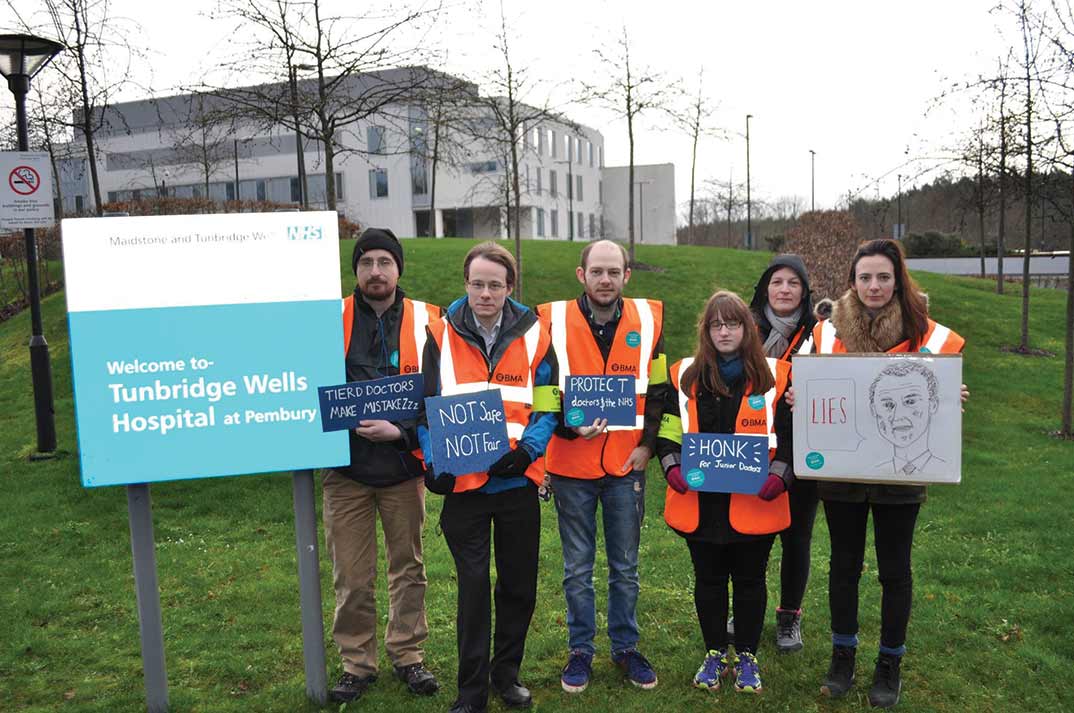Junior doctors took to the streets again last week as part of their series of 48-hour strikes against a ‘dangerous’ new contract they feel is being forced upon them by Health Secretary Jeremy Hunt.
More than a dozen doctors gathered with their placards near the entrance to Royal Victoria Place at Fiveways.
Among them was Dr Aamir Saifuddin, a 29-year-old medical registrar who is responsible for looking after 300 patients during his overnight shifts at Tunbridge Wells Hospital.
Working 13-hour nights, four days in a row, is ‘extremely demanding’ and often leaves the junior doctor fatigued and concerned he might make mistakes.
While this is manageable and part of the job he loves, Dr Saifuddin worries that the new contract will put lives in danger.
“Being a doctor is a tiring job and things get dangerous if those looking after the patients become too tired.
“With the current proposals, that is more likely to happen and more mistakes will inevitably be made; such as people being given the wrong doses of medicine. Patients are going to suffer.”
Doctors believe the introduction of a ‘seven-day’ NHS service, one of the key parts of the contract, will leave them overstretched at a time when hospitals are already lacking staff.
The Academy of Medical Royal Colleges claims the proposed changes ‘lack safeguards’ on hours and working conditions, and: ‘Risk a return of exhausted doctors and rise in medical errors’.
This view is disputed by the Department of Health, which points to statistics showing that each year 11,000 extra people die at the weekend, as opposed to a weekday; evidence of the need for the contract.
Dr Saifuddin said the figures are being misinterpreted by people who have no idea what life is like on the front line of the medical profession.
He said the figures were always going to be inflated as those who come into hospital at the weekend tend to be sicker in the first place.
“People try and avoid going to the doctors if at all possible at the weekend because it is their time off, so if they come to the hospital it is rarely because they have a cold.”
Oncology registrar Dr Nicola Davis was also at the public protest, bringing along her baby, whose pram was used to prop up a placard.
Dr Davis, 31, said the new contract was likely to lead to an exodus of staff, making an already bad situation far worse.
“Many doctors are going to feel under pressure to sign, or else they will lose their livelihood; a significant number will simply walk away.
“I have already had one of my friends quit over the issue a few weeks ago.
“We are overstretched as it is and it is not just a lack of doctors. You need all the support staff to make this seven-day idea work, but there are not enough of them around either.
“There will be fewer people spread over more days.”
The Department of Health say the contract will compensate junior doctors by increasing their base pay, currently at £30,000 per annum for Dr Saifuddin plus bonuses.
However, Dr Davis says this is not enough of an incentive: “We deserve to be paid fairly but even though there will be an increase it is not enough to cover the extension of working time,” she says.
“On a per hour basis we will actually be paid less and they have changed the definition of ‘anti-social working hours’ which pay more.
“We could get a better paying job elsewhere, so money is not the incentive; we do it because we want to help patients and save lives.
“But we won’t be able to do our jobs properly under this new contract. We already stay longer if there are emergencies.
“There is a lot of goodwill in the NHS but it will be lost if this is forced upon us.”
Dr Saifuddin stressed that none of those protesting were doing so in order to prove a political point; all of them desperately hoped they could get back to treating patients ‘as soon as possible’.
“This is not about politics. We are not political at all, our argument is only with Jeremy Hunt and we are not prepared to give up.”
STRIKE EXPLAINED
What is a junior doctor?
They are qualified medical practitioners who are working while engaged in postgraduate training to become a consultant or a GP and can have up to 14 years’ experience. There are 55,000 junior doctors in England, with a starting salary of £23,000.
What does the Health Secretary want?
Jeremy Hunt claims the current contract, that was introduced in the 1990s, is ‘outdated’. He believes plans to roster more doctors on weekends are necessary to reduce the 15 per cent extra risk that a patient will die if admitted to hospital on a Sunday as opposed to a Wednesday.
What do the junior doctors want?
They argue the change constitutes ‘unsociable hours’ and means they will not receive the additional pay for shifts previously classi? ed as unsociable, such as on the weekends. In addition they say the end of guaranteed pay rises linked to time in the job will mean that their pay increases at a slower rate.








